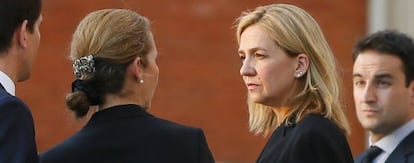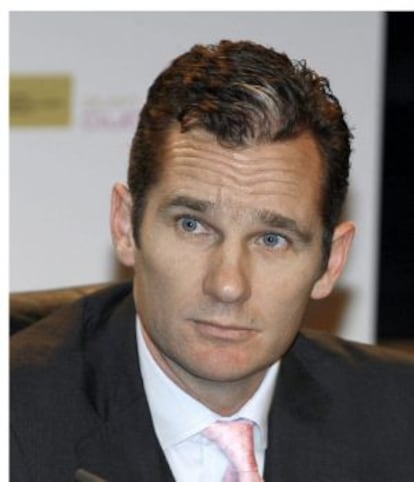Trial involving King Felipe’s sister Cristina to begin January 11
Date set for when royal, her husband and 16 others will sit in dock over Nóos corruption case

A member of the Spanish royal family, her husband, a former regional premier and 15 other people will stand trial early next year over the Nóos scandal.
A court in Palma de Mallorca has set January 11, 2016 as the start date of a historic trial that will mark the first time a royal will sit in the dock in Spain.
It will also be something of a celebrity parade, with royal aides and former government officials called in as either suspects or witnesses.
Because of its scope, the trial will not be held inside the Palma courthouse, but at a larger building located across from the local penitentiary
Princess Cristina, King Felipe’s younger sister, is being accused of collaborating in her husband’s alleged crimes, although state prosecutors have not brought any charges against her. The charges were filed by Manos Limpias, a far-right labor union that has taken other well-known figures to court, most notably former Spanish High Court judge Baltasar Garzón.
Meanwhile, her husband Iñaki Urdangarin faces up to 19 years in prison if found guilty of embezzling around €6 million obtained through no-bid contracts for his Nóos Institute, a non-profit specializing in organizing sports and tourism events. His business partner Diego Torres faces similar charges.
The contracts were awarded by the regional governments of Valencia, Madrid and the Balearics. A former premier of the latter region, Jaume Matas, faces 11 years over several corruption cases including Nóos – which is itself an offshoot of the Palma Arena case, involving a sports venue built with taxpayers’ money that went grossly over budget.
Cristina de Borbón’s involvement in the case stems from the fact that much of the money secured by the Nóos Institute was channeled to Aizoon, a front company jointly owned by herself and her husband. Cristina used company credit cards to pay for personal expenses such as dance lessons and children’s clothing, then claimed them as business expenses in her tax filings, the investigation shows.
Witnesses who have been called to provide testimony at the upcoming trial include former deputy prime minister Rodrigo Rato, who is facing a court case of his own over alleged tax fraud, and former Valencian premier Francisco Camps, who stepped down in July 2011 to avoid facing trial while in office in connection with the Gürtel corruption case.
Ex-Madrid mayors Alberto Ruiz-Gallardón and Ana Botella have also been called in to give depositions. Other salient witnesses include former chiefs of the Royal Household, a lawyer for the royal family and the personal secretary to both of King Felipe’s sisters.

Because of its scope, the trial will not be held inside the Palma courthouse, but at a larger building located across from the local penitentiary. It is expected to last several months.
The Nóos investigation began in 2008 as a joint project between Judge José Castro and his anticorruption attorney Pedro Horrach, who had successfully cooperated in the past on graft cases.
But both men had a public confrontation over the issue of Cristina de Borbón, whom Horrach refused to prosecute on the grounds that she was exclusively being targeted because of who she was, at a time when the popularity of the Spanish monarchy was at an all-time low.
Castro instead held that nobody is immune to the law, not even a royal. Cristina unsuccessfully tried every legal avenue available to her to avoid going to trial.
Cristina de Borbón and her husband were effectively dropped from the Spanish royal family’s official agenda in a bid to distance the institution from claims of corruption.
English version by Susana Urra.







































